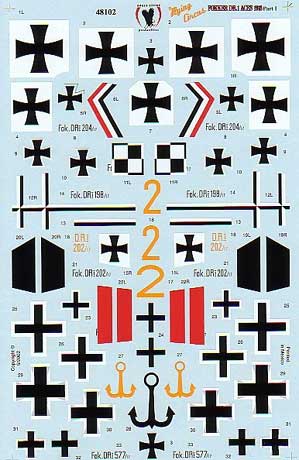S u m m a r y
|
| Catalogue
Number and Description: |
48102 - Fokker Dr.1 Aces 1918
Part 1 |
| Scale: |
1/48 |
| Contents and Media: |
Waterslide decals |
| Price: |
May vary according to place of
purchase (USD$10 if purchased
directly from AeroMaster) |
| Review Type: |
FirstLook |
| Advantages: |
Perfect register, thin carrier
film, interesting subjects. |
| Disadvantages: |
|
| Recommendation: |
Recommended |
Reviewed
by Rob Baumgartner

Eagle Strike's
1/48 scale Fokker Dr.1 Aces is available online from
Squadron.com
Eagle Strike is keeping WW1 modelers happy with a steady stream of new
releases.
As the title suggests, Fokker Dr1 Aces 1918 is only the first sheet of
what promises to be an invaluable collection of alternate markings for
this well known aircraft.
Six different aircraft are covered and the markings have been sized for
the Dragon kit. The carrier film is very thin and all colours were printed
in perfect register. Color density is very good and judging by previous
sheets, adhesion should not be a problem.
 1.
Fokker Dr1 204/17 flown by Vzfw Paul Baumer, Jasta Boelcke, 1918 1.
Fokker Dr1 204/17 flown by Vzfw Paul Baumer, Jasta Boelcke, 1918
This is a familiar machine that has also appeared on AeroMaster sheet
48-074. It too gave us markings for the early scheme of this much-used
triplane. Hopefully Part 2 of Fokker Dr.1 Aces will provide for the later
markings for 204/17.
Note that the black cabane struts should have its top tips in white.
The black edge around the rudder will have to be painted by the modeller.
2. Fokker Dr1 198/17 flown by Ltn. Hans Werner of Jasta 14, France,
January 1918.
Werner achieved seven victories, including the Australian ace Maj. R.S.
Dallas DSO, DCS. Dallas, the CO of No. 40 Sqn., was downed on the first of
June.
Photos show that the above triplane should have the blue return on the
bottom of the fuselage with this color also outlining tail plane.
3. Fokker Dr1 flown by Ltn Hermann Becker of Jasta 12, France, March 1918.
Becker was a 23-victory ace who later commanded Jasta12. The war ended
before he could receive his Pour le Merite for which he had previously
been nominated.
Later in its life this aircraft also had the fuselage insignia on the
top deck behind the pilot.
4. Fokker Dr1 202/17 flown by Ltn Walter Goettsch Jasta 19.
This is a great choice. It was probably Goettsch’s first triplane with
Jasta 19. Photos of 202/17 in Alex Imrie’s triplane book suggest the
cabane struts were solid olive and not blue as shown. The pics also
clearly show the blue return along the bottom of the fuselage that the
diagram does not reproduce.
Thoughtfully, Eagle Strike supplies the aircrafts scratchy black serial
number. The fact that it was illegible, necessitated the painters to
repeat it in yellow on the original aircraft.
Worthy of mention is that this machine had its wheels reversed, i.e.
with the outside disc facing inwards. This widened the wheel track because
of the conical shape of the disc and thus allowed better stability on
rough airfields.
5. Fokker Dr1 577/17 of Ltn. Rudolf Klimke, Jasta 27, May 1918.
This is another great choice. At last we get markings for this very
popular triplane.
Thanks to Eagle Strike using the latest published information, their
representations are accurate. Those with the Windsock Datafile Special on
the triplane (published in 1991) will know what I mean.
This 16-victory ace used the symbol of an anchor on his aircraft at his
mother’s insistence. She thought this would give him good luck. This it
did as Klimke survived the war.
Those wanting greater accuracy should note that Klimke only used a lap
strap to restrain him in his seat. The discarding of the more usual
shoulder harness was due to his small size. The new arrangement allowed
him to reach his guns and have much better movement to look over his
shoulder.
6. Fokker Dr1 521/17 flown by Oberleutnant Robert Greim of Jasta 34b, June
1918.
This is a machine from JG I that was handed down to Jasta 34b when the
former was re equipped with the Fokker D.VII.
While fighting a Bristol Fighter in this aircraft, the cowling came off
and damaged the top wing and an interplane strut. This forced Griem to
land, which he did safely.
While on the ground, 521/17 was destroyed during a British air attack
on 16 July 1918 at Foucaucourt.
Another well produced sheet from Eagle Strike, which does not
disappoint. The usual high quality of printing is maintained which makes
them a favorite for those that wish alternative markings to those provided
in kits.
Recommended
Thanks to Eagle
Strike / Aeromaster for the review samples
Review Text Copyright © 2003 by
Rob Baumgartner
This Page Created on 28 January, 2003
Last updated
14 August, 2003
Back to
HyperScale Main Page |
Home | What's
New | Features
| Gallery |
Reviews | Reference
| Forum
| Search